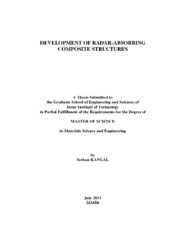Please use this identifier to cite or link to this item:
https://hdl.handle.net/11147/3616Full metadata record
| DC Field | Value | Language |
|---|---|---|
| dc.contributor.advisor | Tanoğlu, Metin | - |
| dc.contributor.author | Kangal, Serkan | - |
| dc.date.accessioned | 2014-07-22T13:51:57Z | - |
| dc.date.available | 2014-07-22T13:51:57Z | - |
| dc.date.issued | 2013 | - |
| dc.identifier.uri | http://hdl.handle.net/11147/3616 | - |
| dc.description | Thesis (Master)--Izmir Institute of Technology, Materials Science and Engineering, Izmir, 2013 | en_US |
| dc.description | Includes bibliographical references (leaves: 90-94) | en_US |
| dc.description | Text in English; Abstract: Turkish and English | en_US |
| dc.description | xiv, 100 leaves | en_US |
| dc.description | Full text release delayed at author's request until 2016.07.29 | en_US |
| dc.description.abstract | Radar absorbing materials (RAMs) are dielectric or magnetic materials that has capacity for absorbing electromagnetic waves. In order to increase frequency range (bandwidth) of the absorbance, several structures have been already proposed by several researchers. Objective of this study is to design, fabricate and characterize RAMs based on glass fiber reinforced epoxy composites within 2-18 GHz frequency range. For achieving radar wave absorbance, several structures such as Dallenbach layer, Salisbury screen and Jaumann absorber were designed and manufactured from polymeric composites. Glass fiber / epoxy system were employed as a base structure. Carbonyl Iron based powders were used as a filler for electromagnetic wave absorber in epoxy matrix. In Salisbury screens and Jaumann absorbers resistive sheets are used to increase the bandwidth of absorbance. Glass fabric surfaces were cotaed with thin layer of metallica conductor with surface resistances up to 1000 ï — to act as a resistive layers within the composite structure. Coatings were done by a large scale magnetron sputtering unit. Resulting structures achieve 12 dB reflection loss with thicknesses varies from 2.65 to 3.15 mm and the resonant frequency detected as 7 GHz. Since in many applications composites are implemented into vehicles and structures such as aircraft wings and wind turbine blades, the purpose of Radar Absorbing Sturctures (RAS) is not only increase the bandwidth of absorbance, but also to serve as a structural element in which. For this reason, structural and physical performance of RAMs has been one of great importance. In this study, mechanical and thermomechanical properties of developed RAMs were also characterized to evaluate the structural performances. It is observed that, addition of carbonyl iron affected the mechanical properties due to lack of binding with epoxy matrix. This effect can be clearly seen at tensile and impact properties that up to 30% losses were observed. | en_US |
| dc.language.iso | en | en_US |
| dc.publisher | Izmir Institute of Technology | en_US |
| dc.rights | info:eu-repo/semantics/openAccess | en_US |
| dc.subject.lcsh | Radar--Materials | en |
| dc.subject.lcsh | Electromagnetic waves--Transmission | en |
| dc.subject.lcsh | Electromagnetic waves--Mathematics | en |
| dc.subject.lcsh | Composite materials | en |
| dc.title | Development of Radar-Absorbing Composite Structures | en_US |
| dc.type | Master Thesis | en_US |
| dc.authorid | 0000-0002-0967-4680 | - |
| dc.institutionauthor | Kangal, Serkan | - |
| dc.department | Thesis (Master)--İzmir Institute of Technology, Materials Science and Engineering | en_US |
| dc.relation.publicationcategory | Tez | en_US |
| dc.identifier.wosquality | N/A | - |
| dc.identifier.scopusquality | N/A | - |
| item.openairecristype | http://purl.org/coar/resource_type/c_18cf | - |
| item.languageiso639-1 | en | - |
| item.openairetype | Master Thesis | - |
| item.grantfulltext | open | - |
| item.fulltext | With Fulltext | - |
| item.cerifentitytype | Publications | - |
| crisitem.author.dept | 01. Izmir Institute of Technology | - |
| Appears in Collections: | Master Degree / Yüksek Lisans Tezleri | |
Files in This Item:
| File | Description | Size | Format | |
|---|---|---|---|---|
| 10010497.pdf | MasterThesis | 6.81 MB | Adobe PDF |  View/Open |
CORE Recommender
Page view(s)
1,042
checked on Mar 31, 2025
Download(s)
1,798
checked on Mar 31, 2025
Google ScholarTM
Check
Items in GCRIS Repository are protected by copyright, with all rights reserved, unless otherwise indicated.